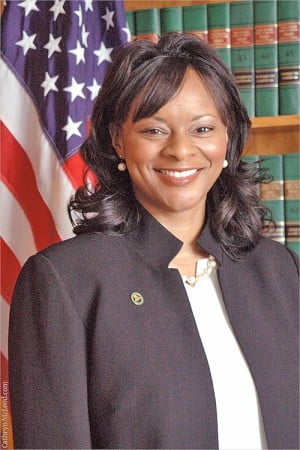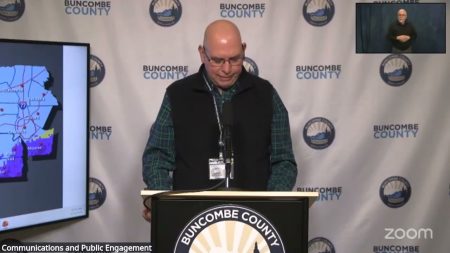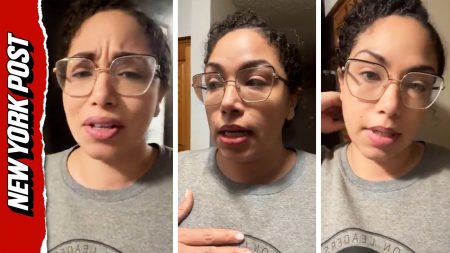Mayor Terry Bellamy is Young, Gifted and on Track

Asheville’s Wunderkind
by Sharon Shervington
Gravitas isn’t a quality that one acquires overnight. But Mayor Terry Bellamy has been in politics for 14 years now, and it was just that combination of confidence, depth of knowledge on issues, and vision – gravitas – that she projected in an interview at her office in downtown Asheville a few days after announcing that she will make a second bid for election to the 10th District seat in Congress.
Since emerging as a candidate 14 years ago, Bellamy spent six years on the city council and seven as mayor. In our interview the mayor said that she was happy with the legacy she will leave. “The time is right to move on. It’s a good moment,” she said. “I’ve accomplished what I said I would.”
One of the most important themes that she focused on was collaboration and consensus, something that had not always run smoothly among Asheville’s various political entities. “Working with the city and the county and the council and the Chamber [of Commerce] has been all about working together. It’s about good communication and that has helped bring us jobs. It’s helped with New Belgium [Brewery], from which some 600 jobs are expected over the next few years; there are already 140 within a year of them being open. And it also has helped with PLI, which is the largest supplier of key cards internationally, and is continuing to grow.” She said she also was “pleased to have a good relationship with Mission Hospital,” which is Western North Carolina’s largest employer.
Higher National Profile
And Mayor Bellamy has been getting her ducks in a row in a broader context both regionally and nationally too. She is on the board of the School of Arts and Sciences at UNC Charlotte, her alma mater. And she is First Vice Chair of the Land of Sky Regional Council, which provides a forum for local leaders to collaborate on issues of regional concern and promotes joint federal, state, and local efforts to provide for orderly long-term development.

She is a member of the NC Metropolitan Mayors Coalition and of the U.S. Conference of Mayors. That latter membership led to her being invited to meet with President Barack Obama shortly after he took office, giving her and other selected mayors an opportunity to lobby the president and key Cabinet members on the stimulus package.
Bellamy leads the national Conference’s Task Force on Hunger and Homelessness, which consults with the Department of Housing and Urban Development and with the USDA. When its most recent annual report was released in December 2012, she noted, “Dealing with growing needs and dwindling resources is nothing new for mayors, but we are especially concerned about what could happen to our emergency food and shelter programs next year, and in the years to come.”
At its January meeting this year the Task Force put together a program that collects unused and unwanted pills, keeping them out of the hands of children and others who might be harmed by accidental ingestion.
Last to Feel the Impact
Given the difficult economic climate of much of her tenure as mayor, Bellamy is proud of her accomplishments on affordable housing, the homeless, and hunger. The first of those issues is particularly close to the mayor’s heart. “I really wanted to see more affordable housing stock,” she said.
Formerly Marketing Director for Mountain Housing Opportunities, Bellamy proudly cited affordable housing that has been developed in the River Arts District, and said that Congressman Mark Meadows had partnered with Asheville to achieve that goal. Also in the River Arts District, billboards have been put up at the artists’ request. She noted that Buncombe County had come up with $2 million to finance 62 affordable housing units through MHO. Altogether this will be a $13 million project.
Bellamy added that “despite the recession, Asheville was the last to feel its impact and the first to come out of it.”
Connecting and Collaborating
Isaac Coleman, who has known Bellamy for more than 15 years and was her campaign manager when she first ran for City Council, said, “From the first time I met her, the thing that impressed me was how smart she was, how intelligent. I was also impressed that she was from Asheville and really wanted to help here.”
Coleman said that Mayor Bellamy has done a great job in terms of national connections. “Her connection with the president and his team was a big factor in a lot of money coming into Asheville at a difficult time. She was able to work herself into that scene and it has been very helpful. She is a wonderful leader. When I first knew her I don’t believe she was even thinking that one day she would make history.” (She was Asheville’s first black mayor and the state’s youngest mayor.)
Bellamy also praised K. Ray Bailey, formerly president of A-B Tech and then a County Commissioner, and Virgil Smith, former publisher of the Asheville Citizen-Times, for working to get funding for the Reed Center, which will be the first such multi-use fully certified green building of its kind here. It will provide services from job training to wellness programs. Originally it was scheduled for renovation, but on closer examination, it became clear that something completely new was needed.
Partnerships & Grants Make Much Possible
“[Former Congressman] Heath Shuler helped get money for the Community Development Block Grants that are being used to support OnTrack Financial Education and Counseling and Mountain Housing Opportunities,” she said, adding that [Senator] Kay Hagan and [former Representative] Charles Taylor had been strong advocates as well. She said that OnTrack was something that could help more African Americans become credit-worthy, a necessity for access to some of the new homes. The organization has also been instrumental in preventing foreclosures and helping people start small businesses. Other agencies that the grants help fund are Green Opportunities and Mountain BizWorks.
Mayor Bellamy also discussed developments in the Asheville Police Department, the courts and crime in general. “Since July we’ve had a 6% drop in crime overall and a 16% drop in crime in public housing. I’m also delighted that we were able to appoint an African American Chief of Police.”
Bellamy also discussed a meeting with Governor Pat McCrory, who wants to make sure that drug courts are happening across the state – but with some modifications, including broader sentencing options. “This gives people who are self-medicating an opportunity to have a court counselor. That, in turn, helps them access services that support them in ending drug use. Then they can be drug screened regularly and that creates a possibility that they can avert jail time,” she said.
Judge Calvin Hill, who handles many drug cases, talked about the state’s efforts to stop building prison after prison. “This is something that is being looked at all over the country. Here in Asheville, we work with RHA Corp. to handle a multi-faceted approach in cases that often involve not only substance abuse but also mental health issues.”
Once a participant is paired with a counselor he or she can easily get drug screenings and mental health assessments, and sometimes help in finding employment. “There are two major drug courts here,” Hill said. “One for felonies, [and] the other is involved in DSS actions like child care; reunification, and affordable housing.”
This is something that judges and the District Attorney’s Office work on together, Hill noted, much as Mayor Bellamy and the City Council have worked together to make this happen. Jail diversion, he said is not only more humane and less punitive, but also cost-effective.
The City of Asheville Youth Leadership Academy, or CAYLA, is another project dear to the mayor’s heart, and one that she has personally championed. “This program is transforming generations,” she said. “We have been seeing members graduating from high school, now we are seeing them graduate from college. And that has led parents, encouraged by their young graduates’ successes, to say ‘I can do this too.’ Many parents of our CAYLA grads are going to A-B Tech and finishing their GEDs.” She complimented A-B Tech president Dr. Hank Dunn for earmarking funds to help support non-traditional students and students of color.
Veterans have also been a priority for the mayor. “There are many organizations working together to brighten the future for our returning sons and daughters. ABBCM, the Arc of Buncombe County, A Vet’s Place, and Helios are all working to help veterans get the services they need, from short- and long-term housing to job training to medical services.”
Bellamy also said that A-B Tech has been a good resource for veterans. Overall, she noted, “We’ve used a coordinated-service model, a kind of cross-pollination. And that is a strategy that can work well in a variety of areas.”
Improved Transportation
When asked what the most challenging element of her job has been, she thought for a while and then said “limited resources.” She then talked about some of the changes that have been a result of Asheville’s growth over the last several years. “We have a sleeping population of 89,000 in Asheville, but during the day that swells to 140,000. So that puts some pressure on our infrastructure. I would love to have a sidewalk on every street and more bike lanes, but we don’t yet have the resources for that.” On her watch, the transportation system has improved: new buses, while costly, are energy efficient, saving money in the long run.
CAYLA; affordable housing; better transportation; jobs; a good environment for business; a reduced crime rate; a better way of dealing with drug cases and sentencing; a strong push for fitness and wellness – these are all areas where Asheville’s mayor can point to success, showcasing her strengths as she pursues higher office.
Hard Campaign to Come
It is certain that the 10th District race will not be an easy one. But then Mayor Terry Bellamy did not achieve the mayoralty on her first attempt. And she is nothing if not tenacious.
“The experiences I bring to the table will bring the region forward. Attractive, affordable housing; opportunities for fitness and wellness; environmentally sound building standards; a holistic environment in our city, and of course jobs, are all areas where we have had success. And all of these represent the shared values and goals that we have in the Asheville community. Asheville is in a good place now, not perfect, but steady. That is why I am taking this next step now, because I’ve done what I said I would as mayor and because I think I can replicate these successes in other communities.”
“I am willing to talk to anyone,” she said, her gravitas showing, “I will listen to anyone. I want to hear what the people’s desires are for the region. And then I want to work with them to make it a reality.”





